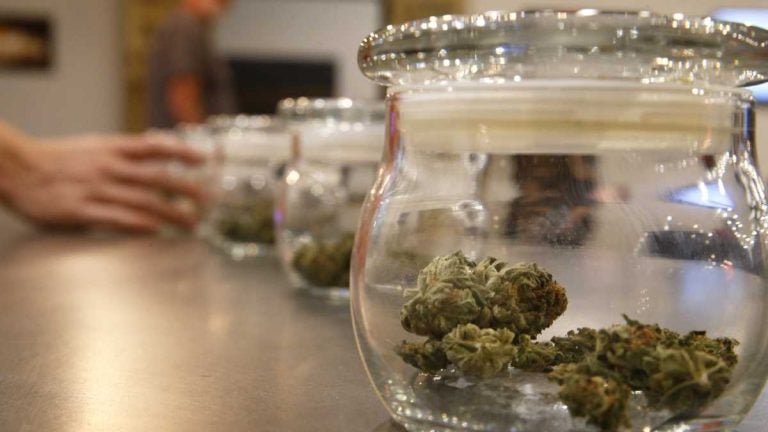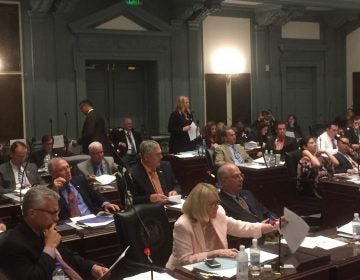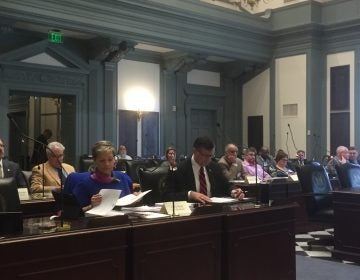Delaware bill to legalize pot amended to address safety, regulatory concerns
Delaware would have six months to prepare for implementation.

(Brennan Linsley/AP Photo)
Lawmakers in favor of legalizing recreational marijuana in Delaware aim to move legislation forward with amendments they say will address concerns about safety and regulation.
The move comes more than three months after an Adult Use Cannabis Task Force released a final report outlining some barriers to legalization.
“We really did take the comments of everyone on that task force very seriously,” said state Rep. Helene Keeley, D-Wilmington, the primary sponsor of the bill.
“There were several people who would not want this bill to go forward at all. But we’re trying to strike a balance between allowing a product 61 percent of Delawareans would like to have access to legally and making sure we keep people safe and protected.”
The amendment directs 10 percent of tax proceeds to the Department of Safety and Homeland Security to fund drug recognition training, purchase devices that measure THC levels as they become available, and implement pilot programs to better identify and deter drugged driving.
Delaware would have six months to prepare for implementation. Keeley said she believes that’s enough time for the state to train law enforcement and purchase technology that measures impaired driving.
“The technology is advancing very quickly, and there are several different pilot programs being tested right now and our hope is one of those products would be worthy of Delaware Homeland Security contracting and implementing those devices on Delaware roads,” she said.
The amendment also lays out packaging requirements, prohibits products that resemble candy or cartoon characters and requires information for consumers about how to interpret the information on the marijuana product label about health effects and potential interactions with prescription and nonprescription medications.
Among other requirements, the amendment makes clear employers are not obligated to allow marijuana activities, and spells out licensing requirements for selling marijuana, including a training process for licensees.
“The devil is in the details, and that’s why we’ve strived to be deliberate, serious, and thoughtful about legalizing and regulating cannabis,” said state Sen. Margaret Henry, D-Wilmington, prime Senate sponsor of HB 110. “This amendment is a reflection of that effort and of our commitment to addressing good faith questions around the implementation and enforcement of HB 110. I’m hopeful that it will help us move forward on this long-overdue correction of criminal justice policy in Delaware.”
The amendment also changes the required two-thirds vote to a three-fifths vote, decreasing the number of votes necessary to pass the bill, because it creates new fees and a new tax, according to the bill.
Last year, a legislative committee advanced Keeley’s legislation to legalize recreational pot for those over 21, but it encountered opposition among special interests and lawmakers, and never went to the floor for a vote.
Keeley said she plans to have a House vote on the updated bill before the General Assembly adjourns on June 30. Should it pass the House, the bill would then move to the Senate. With less than three weeks left in the session, though, Keeley said she couldn’t predict whether both chambers would be able to vote on the measure this year.
Nine other states and Washington, D.C., have legalized recreational marijuana use.
Delaware’s General Assembly approved medical marijuana in 2011, and the first dispensary opened in 2015.
The bill to legalize recreational marijuana would regulate and tax the substance much like alcohol. Individuals would be prohibited from operating a vehicle under the influence, carrying it across state borders and growing or creating products on their own, and companies would still be allowed to drug test employees.
Proponents say marijuana has medical benefits, creates jobs and boosts the economy. Advocates say legalization in Delaware would bring in an estimated $22 million in taxable revenue. Keeley’s current legislation would tax marijuana at $50 an ounce.
Those in favor of legalization argue criminalizing marijuana creates a dangerous illicit market and causes unnecessary arrests of non-violent offenders, often with a racial bias.
While the bill has several supporters, many lawmakers believe too many safety and regulatory issues surround legalization.
Throughout his campaign, Gov. John Carney, D-Delaware, also said he wasn’t on board with legalization. Last year, he met with advocates to hear their point of view. Carney hasn’t said if he would veto a bill if it landed on his desk. However, earlier this month he told WHYY he’s still opposed.
“I just don’t think we ought to be a leader there,” Carney said. “Again, as we’re trying to strengthen our workforce, create an environment where companies can be successful to make Delaware stronger, I don’t think that will do it.”
Last year, Keeley introduced a resolution creating a 25-member task force to research the pros and cons of the legislation and to discuss how to address issues like impaired driving and tax structure.
Cathy Rossi, Vice President of Public and Government Affairs for AAA Mid-Atlantic, was one of the task force members who had concerns, particularly over safety. She said the amendment does nothing to put her mind at ease.
“AAA continues to oppose efforts to legalize and commercialize the recreational use of marijuana because it puts drivers, passengers, cyclists and pedestrians at risk. It impairs motor skills, reaction times, and cognitive abilities, and there does not yet exist an optimal means of measuring marijuana’s impairment behind-the-wheel. Unlike alcohol, per se limits are arbitrary and not based in science,” she said in a statement.
“Legalizing recreational marijuana will only exacerbate an already growing drug-impaired driving problem. Eighty percent of drivers involved with fatal crashes who tested positive for drugs had consumed marijuana before getting behind the wheel. We have a serious drug-impaired driving issue in this country. In fact, more fatal drivers tested positive for drug use than alcohol use in 2015 and 2016. Marijuana, used alone or in combination with other substances, is perhaps our greatest highway safety threat.”
Zoë Patchell of the Cannabis Bureau of Delaware said she supports the amended legislation.
“Cannabis products are already readily available here in Delaware. But because its controlled by the criminal market there’s no testing, labeling or age requirements,” she said.
“The amendment deploys the most robust measures to ensure children won’t be marketed or sold to, unlike the unregulated criminal market. We believe the amendment will make the product safer and make the community safer as well.”
Patchell’s group is holding information sessions about legalization throughout Delaware and has been lobbying in Legislative Hall to encourage legislators to pass the legislation by June 30.
“Delaware cannot afford to wait on this,” she said. “This industry already exists. The bill simply decides who will control the existing multi-million-dollar market — either dangerous criminals or licensed and regulated entrepreneurs.”
WHYY is your source for fact-based, in-depth journalism and information. As a nonprofit organization, we rely on financial support from readers like you. Please give today.





